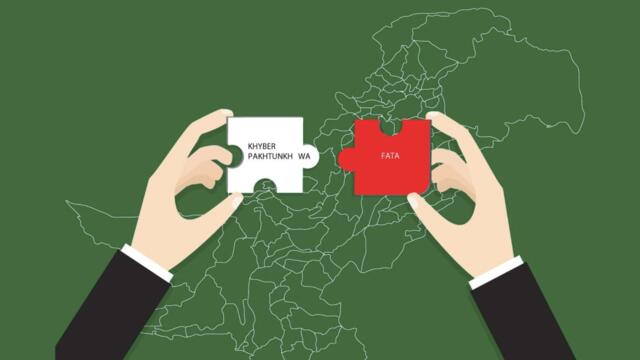- Blogs
- From Reform to Regret: The Unfinished Promise of the FATA–KP Merger
From Reform to Regret: The Unfinished Promise of the FATA–KP Merger

Filza Mahmood
On 28 May 2018, following the 25th Constitutional Amendment, Pakistan formally abolished the colonial-era Frontier Crimes Regulation (FCR) and merged the Federally Administered Tribal Areas (FATA) with Khyber Pakhtunkhwa (KP). The move promised equal rights, improved infrastructure, access to formal courts, and regular policing, offering long-overdue integration to a region historically governed by draconian laws and administrative neglect.
Seven years on, most of these promises remain unfulfilled. While the legal framework has been established, implementation has faltered due to bureaucratic inertia, political ambiguity, and chronic funding shortages. Najibullah Wazir, resident of North Waziristan, captured the growing disillusionment: “We feel betrayed,” he said, fearing the community is once again caught between Taliban militants and the looming threat of another military operation.
Field observations and local interviews echo this sentiment. Frustration and a sense of abandonment are mounting as hopes for rapid development have given way to rising insecurity, especially following the Taliban’s return to power in Afghanistan in 2021. This geopolitical shift has reignited cross-border militancy, deepening instability in the region.
Incomplete infrastructure, under-resourced courts and police, and paralysed public services underscore the state’s limited presence. Further compounding the crisis, international aid cuts, especially following the Trump administration’s shift in U.S. foreign policy, have disrupted vital stabilisation projects.
The 2018 FATA-KP merger raises questions about whether legal success has translated into tangible improvements. Situating the issue within its broader historical and geopolitical context, it highlights how promising legal reform risks becoming a symbolic gesture without sustained political will and structural investment. Real reform demands more than constitutional amendments; it requires unwavering follow-through, genuine local engagement, and a break from the cycle of neglect that has defined the tribal areas for decades.
Disclaimer: The views expressed in this article are solely those of the author and do not necessarily reflect the official stance of The Himalayan Research Institute Pakistan - (THRIP)
_________________________________
Filza Mehmood is an independent researcher and recent graduate of the University of Sargodha. Her research focuses on geopolitics
Contact us

Write with Us
The Himalayan Research Institute is proud to introduce "Himalayan," a dynamic and insightful magazin...
- [email protected]
- +923426470466
- website
